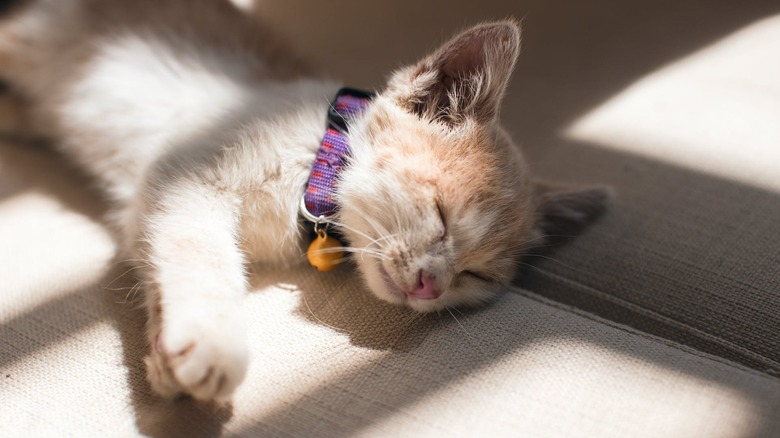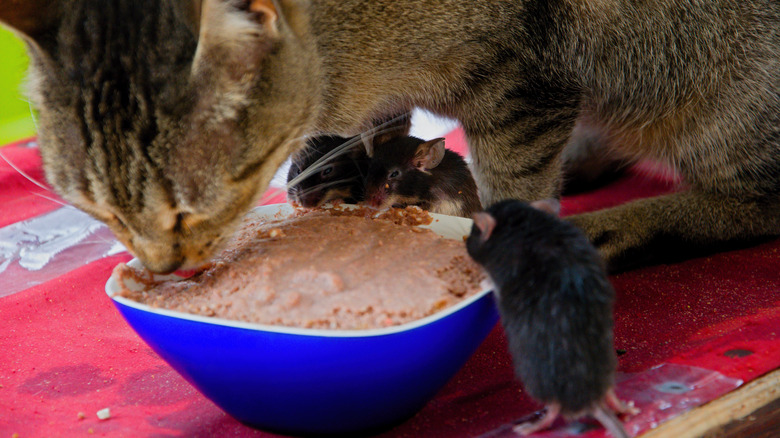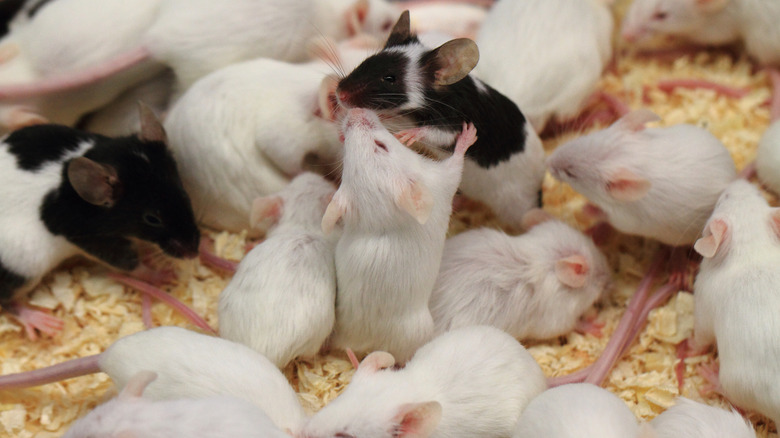Think Twice Before Getting A Cat To Combat A Mouse Infestation
It seems like a perfectly natural solution: Instead of playing a game of cat and mouse with the mice that have moved into your home, why not employ a cat to do the job for you? It's natural for cats to chase and kill mice, after all, and it saves you from using potentially hazardous chemicals in your home. (Unless, that is, you consider smelly cat litter a hazardous substance.) Even companies that offer mouse-eradication products and services, like Terminix and Victor, acknowledge that having a mouser is sometimes effective. The problem is that almost all of the reasoning behind this might be wrong, according to researchers and pest control experts.
If you smell a rat when you hear that cats don't get rid of mice, it's understandable. If you want to know whether cats control mouse populations, you'd naturally ask an expert who knows the answer and has strong reasons only to trust reliable information. Those experts, when it comes to mouse control, are farmers who have some skin in the game. Surveys published in journals The International Journal of Pest Management and Crop Protection show that farmers blame rodents for the loss of crops and often use cats to deal with it, partly because they're concerned about the safety of rodenticides. Shouldn't we conclude that cats are doing their jobs? Well, probably, but there's a key difference between those farm cats and your housecat.
Housecats don't need mouse meals
Cats play with their food, so you might have seen fewer mice since getting one. But the difference between your cat and those farm-tested mousers is that barn cats often rely on rodents as a food source, certainly in places like Myanmar and Ethiopia, where the surveys above were conducted. On the other hand, housecats are mostly playing the hunt, which means they'll kill fewer mice, and this probably explains why some don't pursue mice at all. Domesticated cats who treat mousing as more of a hobby than a vocation often only wound mice, so the few they bother to pursue sometimes get away. And it could even mean that your cat might bring live mice into your home to show you they're serious. Simply put, well-fed housecats simply aren't as aggressive about hunting as their feral and agriculturally employed cousins.
That said, you'll probably see fewer mice partly because the rodents are smart enough to avoid cats. This means nesting and traveling in areas not frequented by housecats, like basements, attics, and inside walls. Mice can even end up in your dryer vent. Sometimes, a predatory presence does cause the mice to move out, especially if they have other reliable food sources nearby. So cats might be more effective in suburban and rural areas where nearby gardens and desirable vegetation make food easy to find, according to a study in Mammal Review.
The smell of cats might not deter mice
You might have heard that the smell of cats will drive mice away from your home. However, research published in the Journal of Ethology suggests that the presence of cats might make some male mice bolder, and female mice are more attracted to bolder males. This could be why Animal Conservation found that the presence of housecats did not affect rodent populations. (The researchers also speculated that cold weather makes housecats retreat to their homes and that healthy cat populations – meaning fewer very hungry feral cats – cause less aggressive hunting.)
There are a few other reasons to be suspicious of cats as mouse exterminators. Given that a mouse can give birth to as many as 173 offspring a year, and those female offspring can mate six weeks after birth, that's quite a burden for a single cat to bear. Under some circumstances, mice can communicate diseases to cats, which might spread to people. And because of their habit of playing with their food, there might be more humane ways to get rid of mice.


